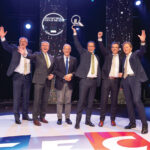Golden Arrow Bus Services pioneers electric buses in South Africa
Golden Arrow Bus Services pioneers electric buses in South Africa
Golden Arrow Bus Services is leading the environmental charge with fully electric buses, as BAZIL GOVENDER reports.
Golden Arrow’s remarkable renewable energy contribution started in 2017 with the pilot installation of two solar plants, each with a kilowatt peak of 25 kWp. The results were encouraging and ultimately led to two of the company’s facilities being declared carbon neutral in 2020, when the relevant depots became net exporters of electricity back into the grid.
Since then, more solar projects have been brought online, with future additions still in the pipeline. The solar plants have generated 1 980 MWh in the 12 months to June 2022, while the latest photovoltaic (PV) installations in production are expected to boost this to 2 680 MWh for the 12 months to June 2023.
Following on from the success of its foray into solar energy, the 161-year-old company set its sights on becoming the first scheduled bus service to operate electric buses in South Africa. Golden Arrow partnered with bus manufacturer BYD and co-funding programme uYilo to test two 100% electric buses for a 12-month period, starting in April 2021.
Extensive testing took place using sandbags to simulate maximum passenger loads. The buses were tested on some of Cape Town’s steepest hills to ensure that the engineering team was satisfied with their performance, charge range, and safety requirements before the buses were added to active service. Today, the two buses carry passengers daily on the Retreat to Cape Town CBD route.
The current test buses do not, however, have Golden Arrow’s preferred seating configuration. The company is therefore importing a 65-seater bus with specifications matching the bulk of the existing Golden Arrow fleet, in order to test how well the configuration would work in an electric vehicle. “Our passengers travel fairly long distances as a result of apartheid spatial planning and urban sprawl, so we prefer our buses to offer as much seating as possible,” says company engineer Gideon Neethling. The 65-seater has recently arrived in Durban harbour and testing is expected to start in September 2022.
Early results indicate energy cost savings of between 60 and 70%, which is particularly pertinent given current record-level fuel prices. According to Neethling, a strong commercial case exists for the incorporation of electric buses into Golden Arrow’s fleet. “Electric buses are expensive, and first figures indicate that they will cost more than double and up to three times what diesel buses cost, but this is counter-balanced by the total cost of ownership, which makes electric buses a commercial solution over their expected operational life,” he says.
Unfortunately, there are no incentives for public transport operators to switch to electric vehicles. On the contrary, ad valorem taxes make importing these vehicles prohibitively expensive. Government will need to introduce policies to make the switch from the internal combustion engine to electric propulsion a more attractive option.
Golden Arrow has its own bold plans to overcome current challenges such as taxation and the current lack of manufacturers focusing on electric buses in South Africa. “The successful testing will in all probability lead to collaborations with local bus builders, in order to build our own vehicles in South Africa,” says Neethling. This will allow the company to circumvent exorbitant taxation and delays in obtaining parts, whilst creating much-needed jobs and facilitating local industry capacity.
Golden Arrow will then aim to procure 60 locally-built electric buses annually from 2024. At first, electricity can be obtained from the company’s own generation capacity and supplemented by electricity supplied by either Eskom or the City of Cape Town. Ultimately, however, maximising the use of renewable electricity and off-peak charging will further reduce the company’s carbon footprint and energy costs. This could lead to a reduction of approximately 60 tonnes of carbon emissions per year, per bus.
Golden Arrow CEO Francois Meyer says he is proud that a company with such a rich history is the first to bring electric buses to South Africa’s public transport space. “Golden Arrow can trace its humble beginnings to horse-drawn trams, so we have really seen it all when it comes to vehicles. I am truly proud to be able to say that our company is leading the charge when it comes to electric buses,” he says. SABOA is equally proud to have Golden Arrow as a member!
Published by
Bazil Govender
focusmagsa




